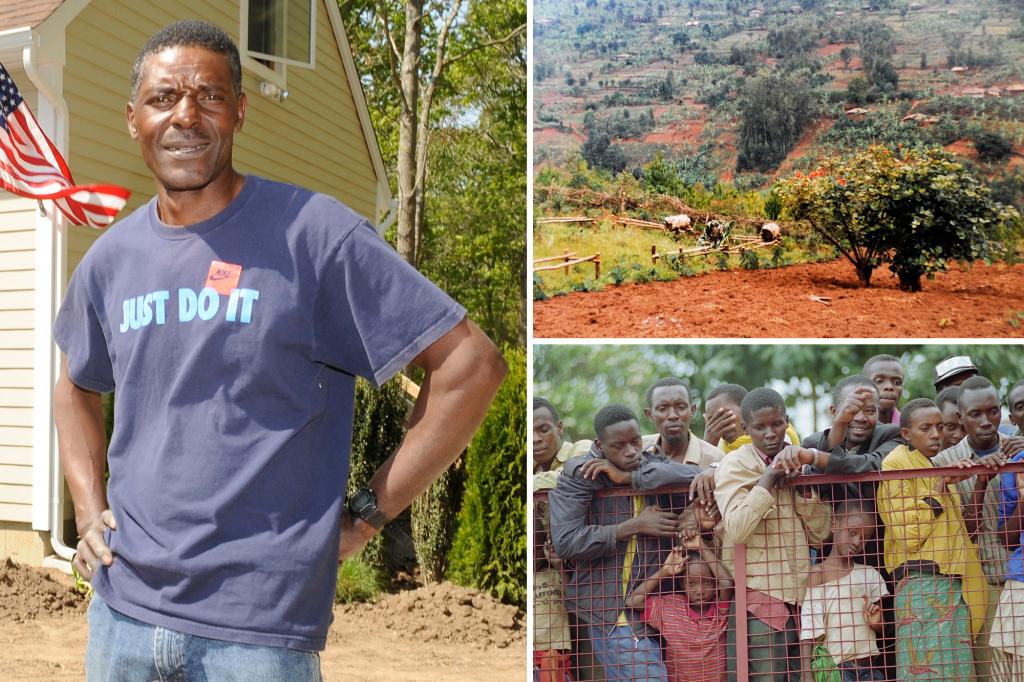A convicted Rwandan genocide war criminal hid on Long Island as a beekeeper for over 20 years after repeatedly lying on immigration papers about his past, the feds alleged.
Faustin Nsabumukunzi, 65, first came to the US in 2004 with his wife and family as a refugee and continued to lie on visa, green card and naturalization papers through the years, denying he had any part in the 1994 Rwandan genocide, according to the US Attorney’s Office in the Eastern District of New York.
He was arrested at his home in Bridgehampton Thursday morning.
“I know, I’m finished,” prosecutors allege he told officers busting him.
Nsabumukunzi — who was a beekeeper in his native country, a career he continued on Long Island — was actually a “Sector Councilor” who directed killings and rapes and also participated in the violence against Tutsis in Kibirizi during the 100-day genocide carried by ethnic Hutus, the feds allege.
Nsabumukunzi assured Tutsis during public meetings that they would be protected and then in private meetings with other Hutus he told them to kill the other ethnic group, prosecutors claim.
And he helped to set up roadblocks in his region to stop Tutsis from fleeing so they could kill them, the feds allege.
During one massacre on April 21, 1994, Nsabumukunzi told armed Hutus to kill a group of Tutsis that were at an administrative office and he even participated by clubbing one person in the head, prosecutors claim.
After, he told the Hutus to remove the dead bodies, referring to them as “trash” and “garbage,” the feds claim.
Nsabumukunzi also encouraged Hutus to rape Tutsis women as a genocidal tool, prosecutors said, citing witness accounts.
He was convicted at a trial he wasn’t present for in a community-based Rwandan court in 2008. He was sentenced to life in prison in that case.
He was also indicted in 2014 by the Public Prosecutor of Rwanda and has been wanted since for genocide crimes.
The Rwandan genocide by Hutus against Tutsis — the two main ethnic groups in the country — took place from April 1994 to July 1994 and resulted in 800,000 Tutsis and moderate Hutus getting slaughtered.
He was expected to appear in Central Islip federal court Thursday afternoon where prosecutors were slated to ask a judge to hold him in jail without bail pending trial on the grounds he’s likely to flee given his frequent travel abroad to countries including Madagascar, France, Cote D’Ivoire, and most recently in March to Togo.
Also, Nsabumukunzi lived in Cote D’Ivoire for a decade prior to his arrival in the US.
“Given the penalties he is facing, his status as a fugitive for decades, and the repeated false claims he is alleged to have made, there are no conditions that would guarantee his appearance at a trial,” the feds alleged in papers ahead of the hearing.
Immigration authorities in 2007 approved Nsabumukunzi’s green card application after he “explicitly denied ever engaging in genocide and denied ever committing a crime of moral turpitude,” the feds alleged.
Then, he applied to become a citizen in 2016 but that application has been pending since.
He is charged with visa fraud, attempted unlawful procurement of naturalization and attempted procurement of naturalization when not entitled and faces up to 30 years behind bars if convicted on all three charges.
Nsabumukunzi could face deportation if convicted. Interpol Rwanda issued a notice that he’s wanted for genocide crimes in 2016.
New York Eastern District US Attorney John Durham said Nsabumukunzi was able to get away with his lies and live in the US for two decades “with an underserved clean slate, a luxury that his victims will never have.”
Nsabumukunzi’s defense attorney, Evan Sugar, maintained his client was a victim of the genocide and denied all of the allegations against him.
“Mr. Nsabumukunzi is a law-abiding beekeeper and gardener who has lived on Long Island for more than two decades,” Sugar said. “He was a victim of the Rwandan genocide who lost scores of family members and friends to the violence.”
“Mr. Nsabumukunzi was rightfully granted refugee status and lawful permanent residence in this country,” the lawyer continued. “We will fight these 30-year-old allegations to the contrary, and Mr. Nsabumukunzi maintains his innocence.”
In a 2006 interview with the New York Times, Nsabumukunzi was described as a refugee of the genocide who lost 200 relatives in the horror. The piece focused on his new life in the US as a beekeeper.
Nsabumukunzi first lived in Houston, Texas with his family until he was connected with a business that needed a new beekeeper on Long Island in 2005.
He was from a well-to-do family in his home country, which owned several businesses including a general store, a movie theatre and a 20-acre farm. He made honey for the farm and taught apiculture at several universities, the outlet reported.
Read the full article here

